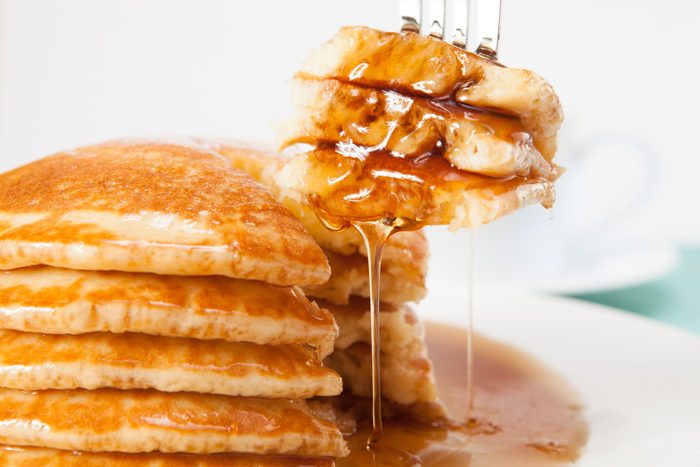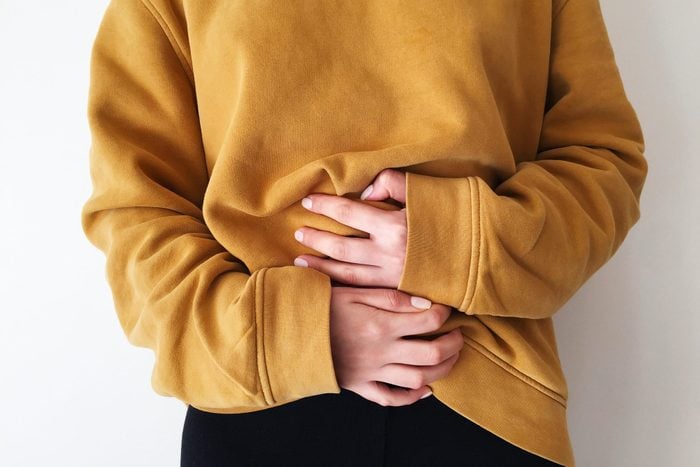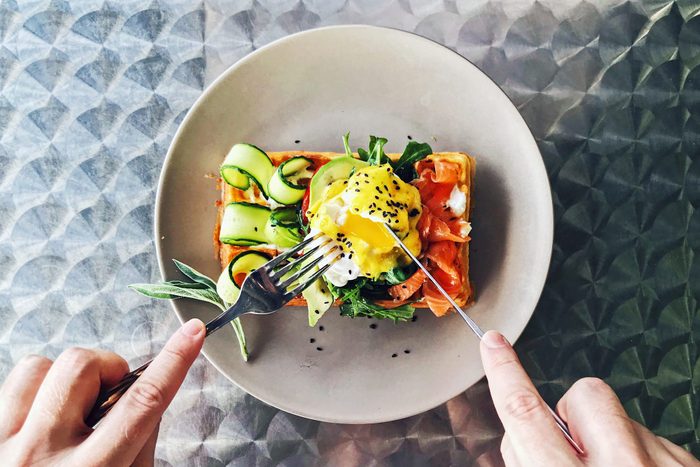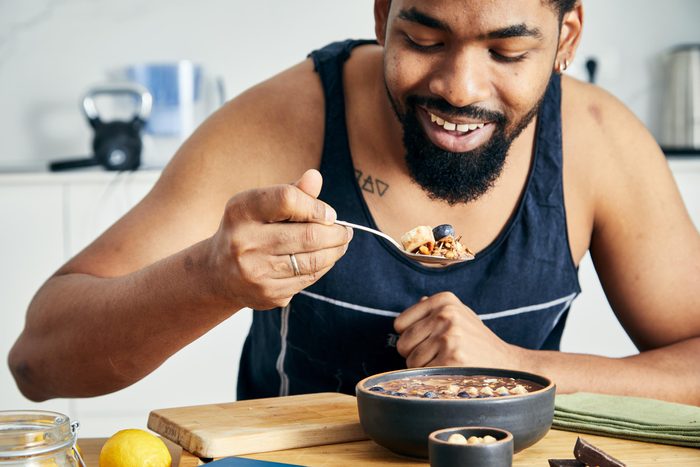
If you’re a fast eater, chances are good you’re aware of it…and in a fast-paced society constantly driven to the next task or obligation, you’re definitely not alone. Consider this a reason to pause: Learning how to eat slower has some great health benefits (and some social ones, too).
To help you learn how to eat slower, we asked Rudolph Bedford, MD, a gastroenterologist at Providence Saint John’s Health Center in Santa Monica, CA to share a little motivation—plus some tips—for how to slow your roll.

Health problems from eating too quickly
If you’ve ever watched someone scarf down dinner, you know it can be pretty off-putting to witness. But this habit isn’t just unseemly—Dr. Bedford says it can take a physiological toll.
1. Bloating and gas
Dr. Bedford explains that when someone says they “inhaled” a meal, this is literal. “The biggest problem with eating too quickly is it causes you to swallow air along with your food, causing bloating, nausea, and gas,” he explains.
2. Overeating and weight gain
Want to lose weight? Slow down the pace of your eating. The old adage is true: It takes about 20 minutes from the beginning of your meal for your stomach to start registering how much you’ve eaten, and then start to send satiety signals to your brain. “Eating slowly will automatically reduce your overall food intake,” Dr. Bedford says.
3. Less enjoyment eating
Dr. Bedford stresses that your taste buds are in your mouth, not your stomach…so if you’re chewing too fast then you’re missing out on all the flavors that make eating good food fun! Plus, the more you savor the flavor of your food, the less likely you are to overeat, he adds.
4. Heartburn
Digestion starts in your mouth, where your saliva begins to break down your food. If it doesn’t get a chance to start the process, then there is more work for your stomach to do. This can cause stomach acid to back up into your esophagus, leading to serious heartburn. “One of the top pieces of advice we give patients with chronic heartburn is to chew their food more, and eat slower,” Dr. Bedford says.
5. Higher risk of choking
Swallowing larger pieces of food without chewing them thoroughly can increase your risk of choking—which can be painful and frightening at best, and fatal at worst.
A List of Foods Dogs Can’t Eat—and How to React If They Do, from Experts

How to eat slower
Thankfully, being a fast eater is fairly easy to fix with these tips from Dr. Bedford.
1. Eat more mindfully
Too many people are distracted eaters…and distracted eaters are more likely to be fast eaters. So, sit down at a table. Use dishes. Turn off the TV, and put away your phone during meals. Pay attention to what, and how, you’re eating. No more standing over the sink, counter, or inside the refrigerator door!
2. Cut up your food
A little prep goes a long way. Cut up food with a knife and fork on your plate into small bite-sized pieces. (And “bite-sized” is smaller than you think, Dr. Bedford says.) People who take bites right off of the food itself tend to take bigger bites.
3. Eat only one small piece at a time
Don’t fill your mouth with food.
4. Chew. Chew more. Now, keep chewing.
Ideally you should chew each piece of food 20 to 30 times, suggests Dr. Bedford. Chew slowly, and chew with your mouth closed to avoid swallowing air (and grossing out your dining companions).
5. Enjoy your food
Eating should be a happy experience! Take time to savor the flavor, texture, smell, and beauty of your food. Be grateful for the food. Talk to your dining companions about the food, and ask about their experience.
7 Mindful Eating Hacks to Cure Indigestion, Bloating, and Gas

It’s worth it
This practice may feel like a lot of extra work at first—especially if you’re hangry or in a hurry and just want the food in your belly fast—but the health payoff for learning how to eat slower is huge, Dr. Bedford says. “Learning to eat slowly and mindfully will help you digest your food better, be more comfortable during and after meals, have less gas and heartburn, avoid overeating, enjoy your food more, and make you a more polite person to eat with,” he says. “This is a bad habit a lot of people grew up doing but you can change it.”
It’s never too late to ditch bad health habits!
Get The Healthy @Reader’s Digest newsletter for a dose of inspired wellness daily, and follow The Healthy on Facebook and Instagram. Keep reading:
